Leadership and Operations Management at Google: A Detailed Report
VerifiedAdded on 2020/11/23
|16
|4453
|461
Report
AI Summary
This report analyzes leadership and management practices within Google's operations. It defines and compares the roles and characteristics of leaders and managers, examining their functions in various situational contexts. The report evaluates different leadership theories, including classical management, transactional leadership, situational leadership, systems leadership, and contingency leadership, assessing their strengths and weaknesses. It explores key approaches to operations management, such as Six Sigma, and the impact of factors within the business environment on operational decision-making. The report uses Google as a case study to illustrate how leaders and managers can improve operational efficiencies, meet business objectives, and adapt to a changing business environment. The report emphasizes the importance of operations management in achieving business goals and analyzes how factors within the business environment impact operational management and decision making by leaders and managers.
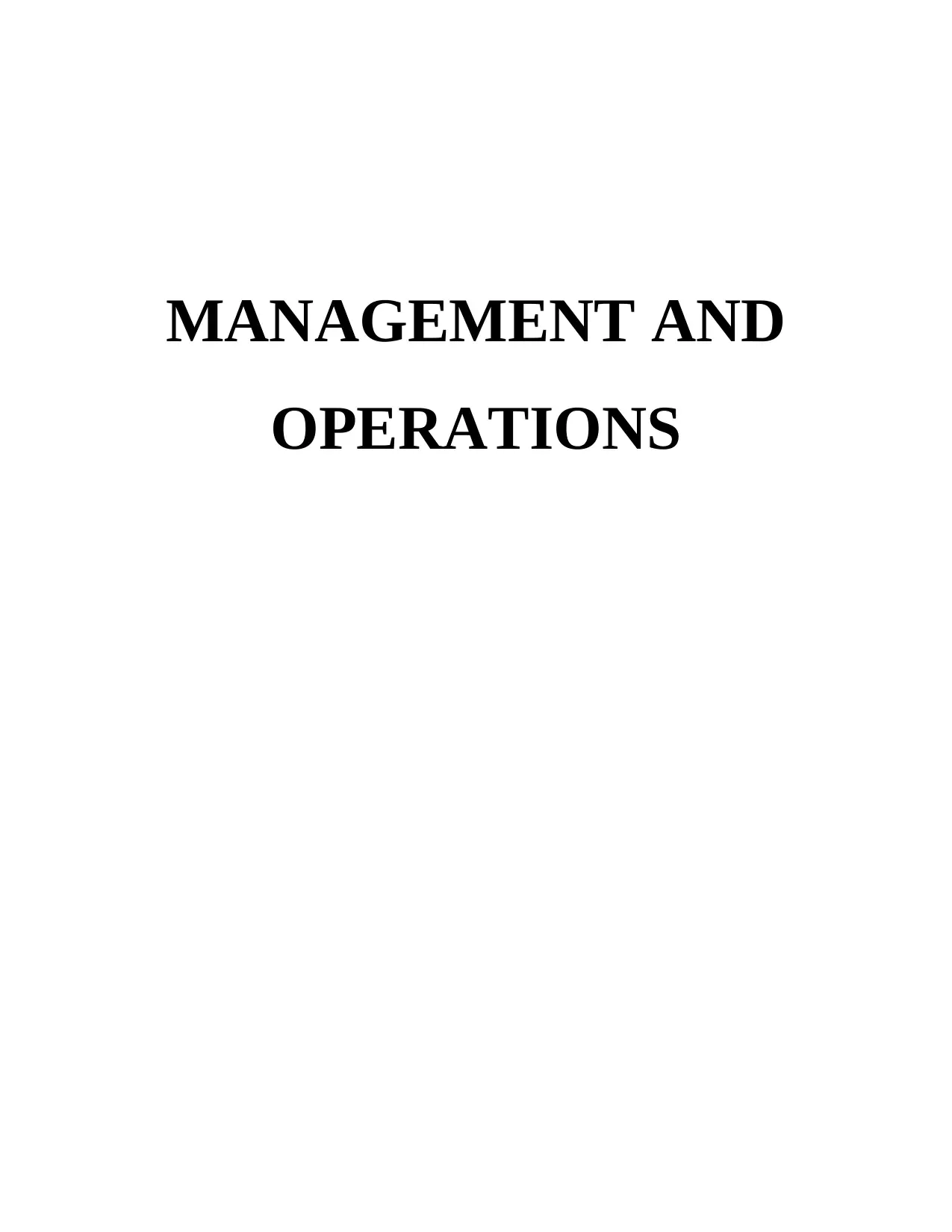
MANAGEMENT AND
OPERATIONS
OPERATIONS
Paraphrase This Document
Need a fresh take? Get an instant paraphrase of this document with our AI Paraphraser
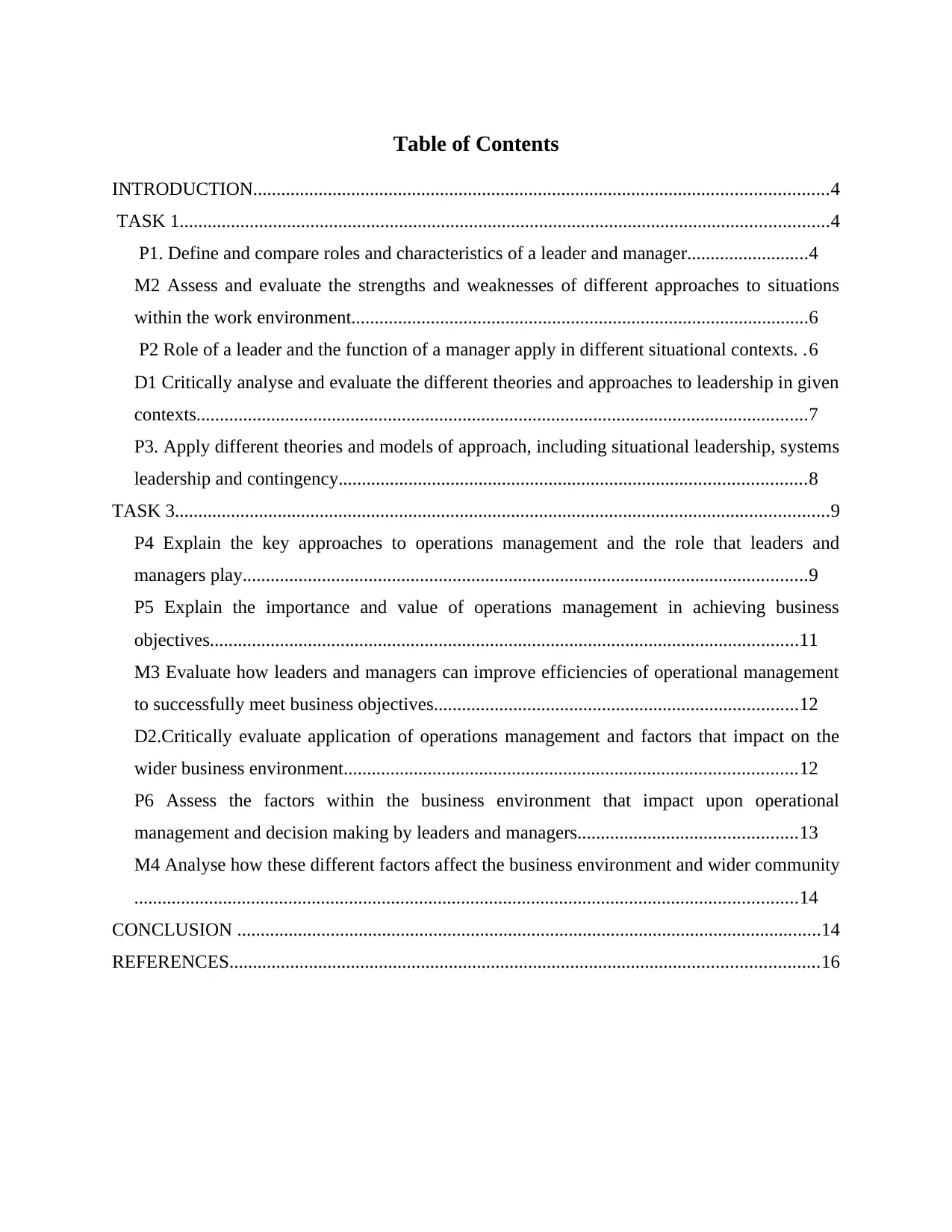
Table of Contents
INTRODUCTION...........................................................................................................................4
TASK 1...........................................................................................................................................4
P1. Define and compare roles and characteristics of a leader and manager..........................4
M2 Assess and evaluate the strengths and weaknesses of different approaches to situations
within the work environment..................................................................................................6
P2 Role of a leader and the function of a manager apply in different situational contexts. .6
D1 Critically analyse and evaluate the different theories and approaches to leadership in given
contexts...................................................................................................................................7
P3. Apply different theories and models of approach, including situational leadership, systems
leadership and contingency....................................................................................................8
TASK 3............................................................................................................................................9
P4 Explain the key approaches to operations management and the role that leaders and
managers play.........................................................................................................................9
P5 Explain the importance and value of operations management in achieving business
objectives..............................................................................................................................11
M3 Evaluate how leaders and managers can improve efficiencies of operational management
to successfully meet business objectives..............................................................................12
D2.Critically evaluate application of operations management and factors that impact on the
wider business environment.................................................................................................12
P6 Assess the factors within the business environment that impact upon operational
management and decision making by leaders and managers...............................................13
M4 Analyse how these different factors affect the business environment and wider community
..............................................................................................................................................14
CONCLUSION .............................................................................................................................14
REFERENCES..............................................................................................................................16
INTRODUCTION...........................................................................................................................4
TASK 1...........................................................................................................................................4
P1. Define and compare roles and characteristics of a leader and manager..........................4
M2 Assess and evaluate the strengths and weaknesses of different approaches to situations
within the work environment..................................................................................................6
P2 Role of a leader and the function of a manager apply in different situational contexts. .6
D1 Critically analyse and evaluate the different theories and approaches to leadership in given
contexts...................................................................................................................................7
P3. Apply different theories and models of approach, including situational leadership, systems
leadership and contingency....................................................................................................8
TASK 3............................................................................................................................................9
P4 Explain the key approaches to operations management and the role that leaders and
managers play.........................................................................................................................9
P5 Explain the importance and value of operations management in achieving business
objectives..............................................................................................................................11
M3 Evaluate how leaders and managers can improve efficiencies of operational management
to successfully meet business objectives..............................................................................12
D2.Critically evaluate application of operations management and factors that impact on the
wider business environment.................................................................................................12
P6 Assess the factors within the business environment that impact upon operational
management and decision making by leaders and managers...............................................13
M4 Analyse how these different factors affect the business environment and wider community
..............................................................................................................................................14
CONCLUSION .............................................................................................................................14
REFERENCES..............................................................................................................................16

⊘ This is a preview!⊘
Do you want full access?
Subscribe today to unlock all pages.

Trusted by 1+ million students worldwide
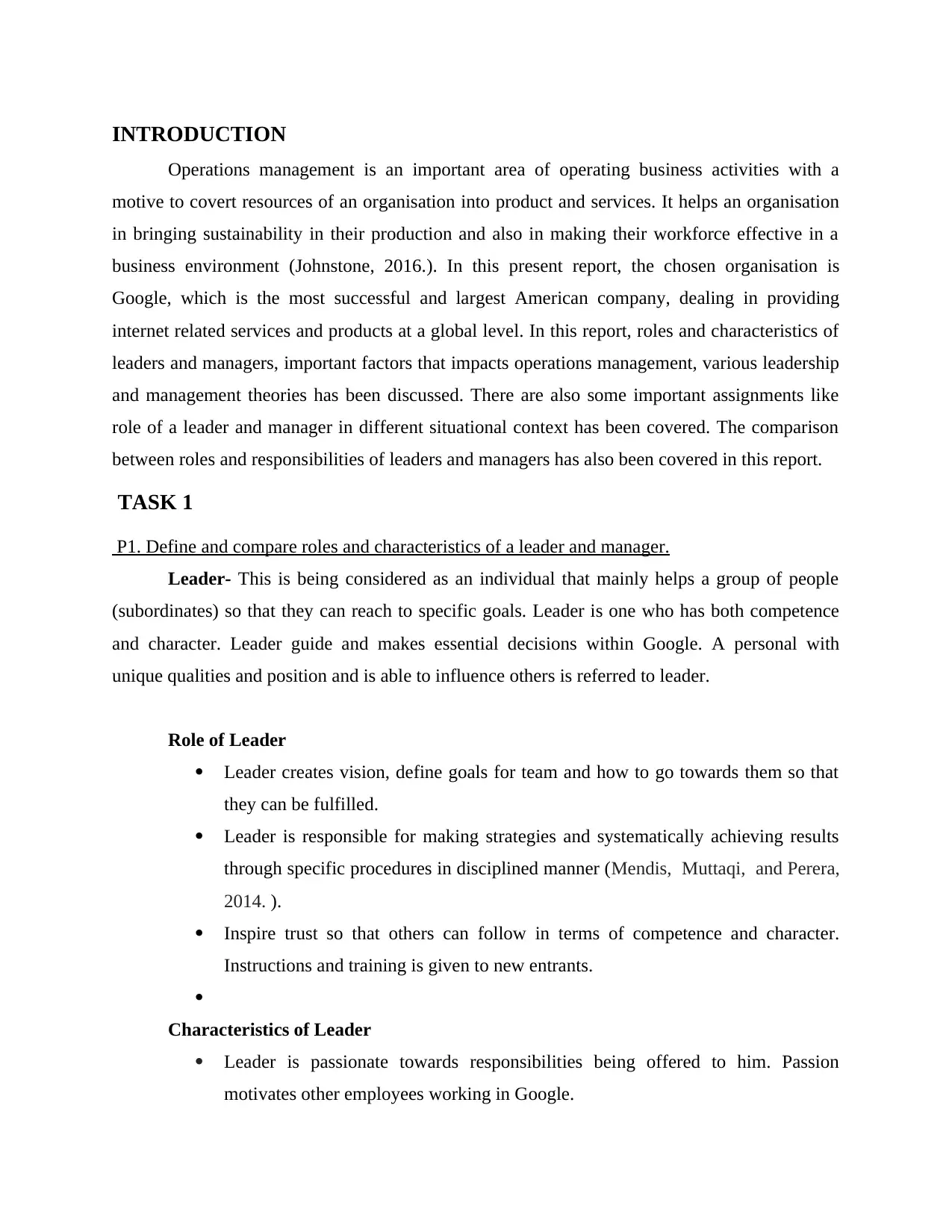
INTRODUCTION
Operations management is an important area of operating business activities with a
motive to covert resources of an organisation into product and services. It helps an organisation
in bringing sustainability in their production and also in making their workforce effective in a
business environment (Johnstone, 2016.). In this present report, the chosen organisation is
Google, which is the most successful and largest American company, dealing in providing
internet related services and products at a global level. In this report, roles and characteristics of
leaders and managers, important factors that impacts operations management, various leadership
and management theories has been discussed. There are also some important assignments like
role of a leader and manager in different situational context has been covered. The comparison
between roles and responsibilities of leaders and managers has also been covered in this report.
TASK 1
P1. Define and compare roles and characteristics of a leader and manager.
Leader- This is being considered as an individual that mainly helps a group of people
(subordinates) so that they can reach to specific goals. Leader is one who has both competence
and character. Leader guide and makes essential decisions within Google. A personal with
unique qualities and position and is able to influence others is referred to leader.
Role of Leader
Leader creates vision, define goals for team and how to go towards them so that
they can be fulfilled.
Leader is responsible for making strategies and systematically achieving results
through specific procedures in disciplined manner (Mendis, Muttaqi, and Perera,
2014. ).
Inspire trust so that others can follow in terms of competence and character.
Instructions and training is given to new entrants.
Characteristics of Leader
Leader is passionate towards responsibilities being offered to him. Passion
motivates other employees working in Google.
Operations management is an important area of operating business activities with a
motive to covert resources of an organisation into product and services. It helps an organisation
in bringing sustainability in their production and also in making their workforce effective in a
business environment (Johnstone, 2016.). In this present report, the chosen organisation is
Google, which is the most successful and largest American company, dealing in providing
internet related services and products at a global level. In this report, roles and characteristics of
leaders and managers, important factors that impacts operations management, various leadership
and management theories has been discussed. There are also some important assignments like
role of a leader and manager in different situational context has been covered. The comparison
between roles and responsibilities of leaders and managers has also been covered in this report.
TASK 1
P1. Define and compare roles and characteristics of a leader and manager.
Leader- This is being considered as an individual that mainly helps a group of people
(subordinates) so that they can reach to specific goals. Leader is one who has both competence
and character. Leader guide and makes essential decisions within Google. A personal with
unique qualities and position and is able to influence others is referred to leader.
Role of Leader
Leader creates vision, define goals for team and how to go towards them so that
they can be fulfilled.
Leader is responsible for making strategies and systematically achieving results
through specific procedures in disciplined manner (Mendis, Muttaqi, and Perera,
2014. ).
Inspire trust so that others can follow in terms of competence and character.
Instructions and training is given to new entrants.
Characteristics of Leader
Leader is passionate towards responsibilities being offered to him. Passion
motivates other employees working in Google.
Paraphrase This Document
Need a fresh take? Get an instant paraphrase of this document with our AI Paraphraser
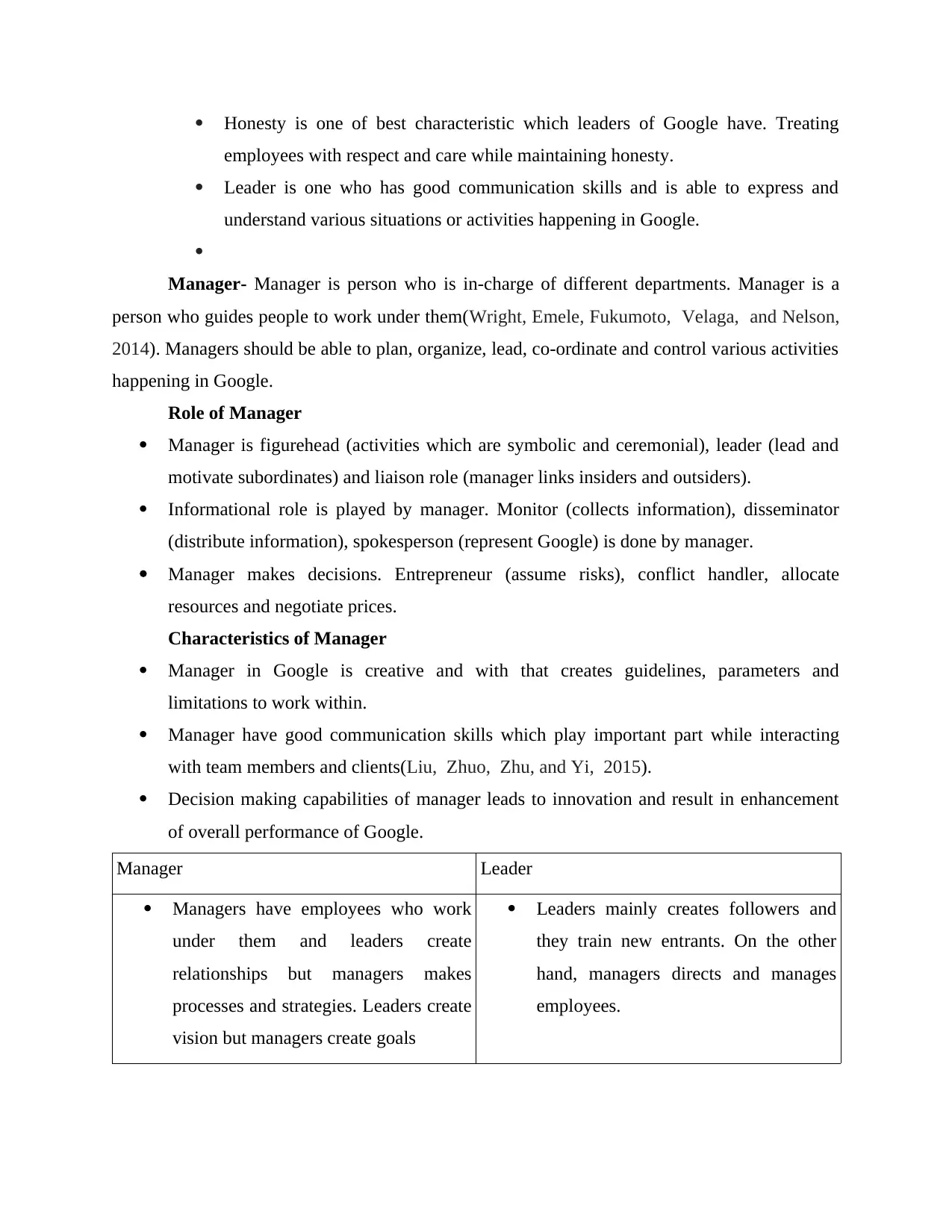
Honesty is one of best characteristic which leaders of Google have. Treating
employees with respect and care while maintaining honesty.
Leader is one who has good communication skills and is able to express and
understand various situations or activities happening in Google.
Manager- Manager is person who is in-charge of different departments. Manager is a
person who guides people to work under them(Wright, Emele, Fukumoto, Velaga, and Nelson,
2014). Managers should be able to plan, organize, lead, co-ordinate and control various activities
happening in Google.
Role of Manager
Manager is figurehead (activities which are symbolic and ceremonial), leader (lead and
motivate subordinates) and liaison role (manager links insiders and outsiders).
Informational role is played by manager. Monitor (collects information), disseminator
(distribute information), spokesperson (represent Google) is done by manager.
Manager makes decisions. Entrepreneur (assume risks), conflict handler, allocate
resources and negotiate prices.
Characteristics of Manager
Manager in Google is creative and with that creates guidelines, parameters and
limitations to work within.
Manager have good communication skills which play important part while interacting
with team members and clients(Liu, Zhuo, Zhu, and Yi, 2015).
Decision making capabilities of manager leads to innovation and result in enhancement
of overall performance of Google.
Manager Leader
Managers have employees who work
under them and leaders create
relationships but managers makes
processes and strategies. Leaders create
vision but managers create goals
Leaders mainly creates followers and
they train new entrants. On the other
hand, managers directs and manages
employees.
employees with respect and care while maintaining honesty.
Leader is one who has good communication skills and is able to express and
understand various situations or activities happening in Google.
Manager- Manager is person who is in-charge of different departments. Manager is a
person who guides people to work under them(Wright, Emele, Fukumoto, Velaga, and Nelson,
2014). Managers should be able to plan, organize, lead, co-ordinate and control various activities
happening in Google.
Role of Manager
Manager is figurehead (activities which are symbolic and ceremonial), leader (lead and
motivate subordinates) and liaison role (manager links insiders and outsiders).
Informational role is played by manager. Monitor (collects information), disseminator
(distribute information), spokesperson (represent Google) is done by manager.
Manager makes decisions. Entrepreneur (assume risks), conflict handler, allocate
resources and negotiate prices.
Characteristics of Manager
Manager in Google is creative and with that creates guidelines, parameters and
limitations to work within.
Manager have good communication skills which play important part while interacting
with team members and clients(Liu, Zhuo, Zhu, and Yi, 2015).
Decision making capabilities of manager leads to innovation and result in enhancement
of overall performance of Google.
Manager Leader
Managers have employees who work
under them and leaders create
relationships but managers makes
processes and strategies. Leaders create
vision but managers create goals
Leaders mainly creates followers and
they train new entrants. On the other
hand, managers directs and manages
employees.
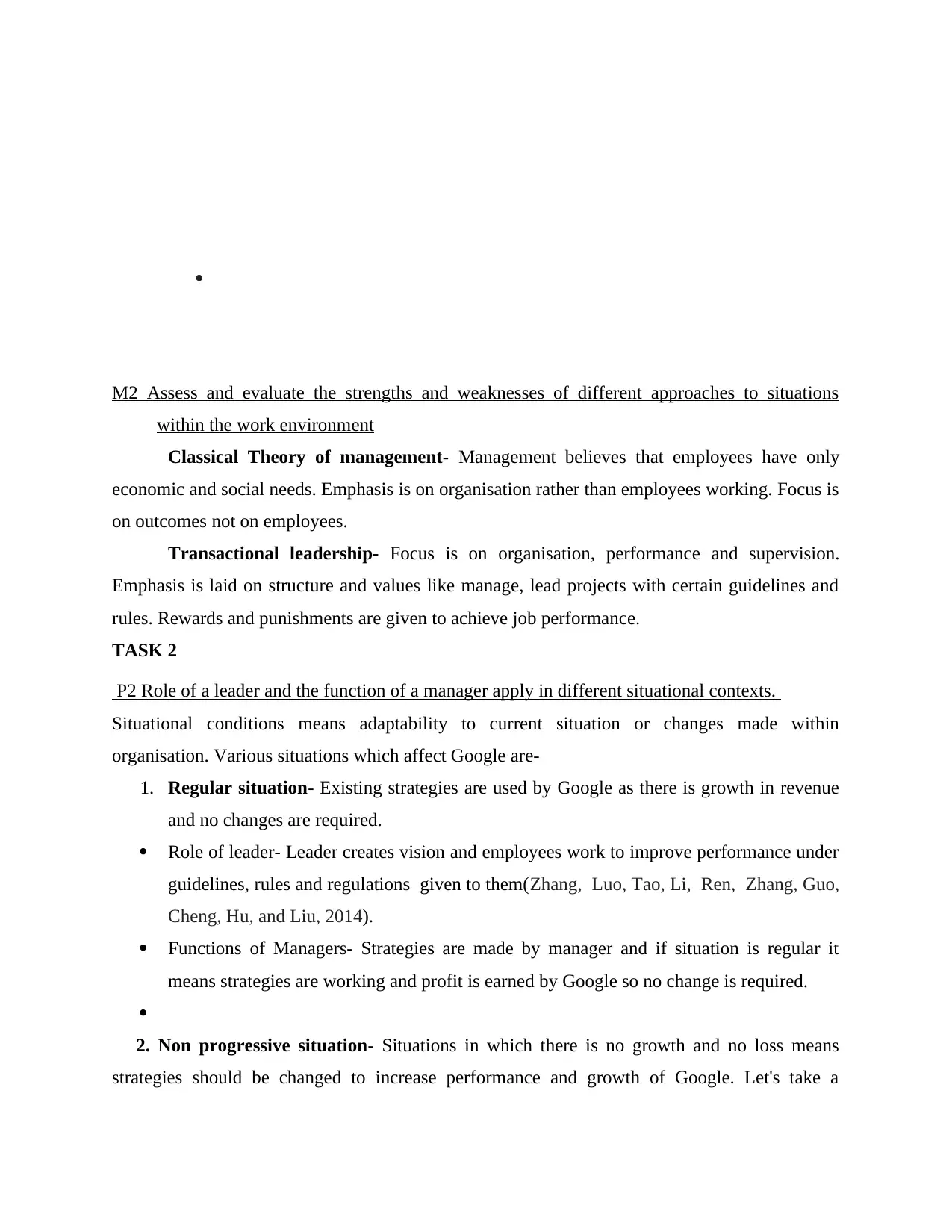
M2 Assess and evaluate the strengths and weaknesses of different approaches to situations
within the work environment
Classical Theory of management- Management believes that employees have only
economic and social needs. Emphasis is on organisation rather than employees working. Focus is
on outcomes not on employees.
Transactional leadership- Focus is on organisation, performance and supervision.
Emphasis is laid on structure and values like manage, lead projects with certain guidelines and
rules. Rewards and punishments are given to achieve job performance.
TASK 2
P2 Role of a leader and the function of a manager apply in different situational contexts.
Situational conditions means adaptability to current situation or changes made within
organisation. Various situations which affect Google are-
1. Regular situation- Existing strategies are used by Google as there is growth in revenue
and no changes are required.
Role of leader- Leader creates vision and employees work to improve performance under
guidelines, rules and regulations given to them(Zhang, Luo, Tao, Li, Ren, Zhang, Guo,
Cheng, Hu, and Liu, 2014).
Functions of Managers- Strategies are made by manager and if situation is regular it
means strategies are working and profit is earned by Google so no change is required.
2. Non progressive situation- Situations in which there is no growth and no loss means
strategies should be changed to increase performance and growth of Google. Let's take a
M2 Assess and evaluate the strengths and weaknesses of different approaches to situations
within the work environment
Classical Theory of management- Management believes that employees have only
economic and social needs. Emphasis is on organisation rather than employees working. Focus is
on outcomes not on employees.
Transactional leadership- Focus is on organisation, performance and supervision.
Emphasis is laid on structure and values like manage, lead projects with certain guidelines and
rules. Rewards and punishments are given to achieve job performance.
TASK 2
P2 Role of a leader and the function of a manager apply in different situational contexts.
Situational conditions means adaptability to current situation or changes made within
organisation. Various situations which affect Google are-
1. Regular situation- Existing strategies are used by Google as there is growth in revenue
and no changes are required.
Role of leader- Leader creates vision and employees work to improve performance under
guidelines, rules and regulations given to them(Zhang, Luo, Tao, Li, Ren, Zhang, Guo,
Cheng, Hu, and Liu, 2014).
Functions of Managers- Strategies are made by manager and if situation is regular it
means strategies are working and profit is earned by Google so no change is required.
2. Non progressive situation- Situations in which there is no growth and no loss means
strategies should be changed to increase performance and growth of Google. Let's take a
⊘ This is a preview!⊘
Do you want full access?
Subscribe today to unlock all pages.

Trusted by 1+ million students worldwide
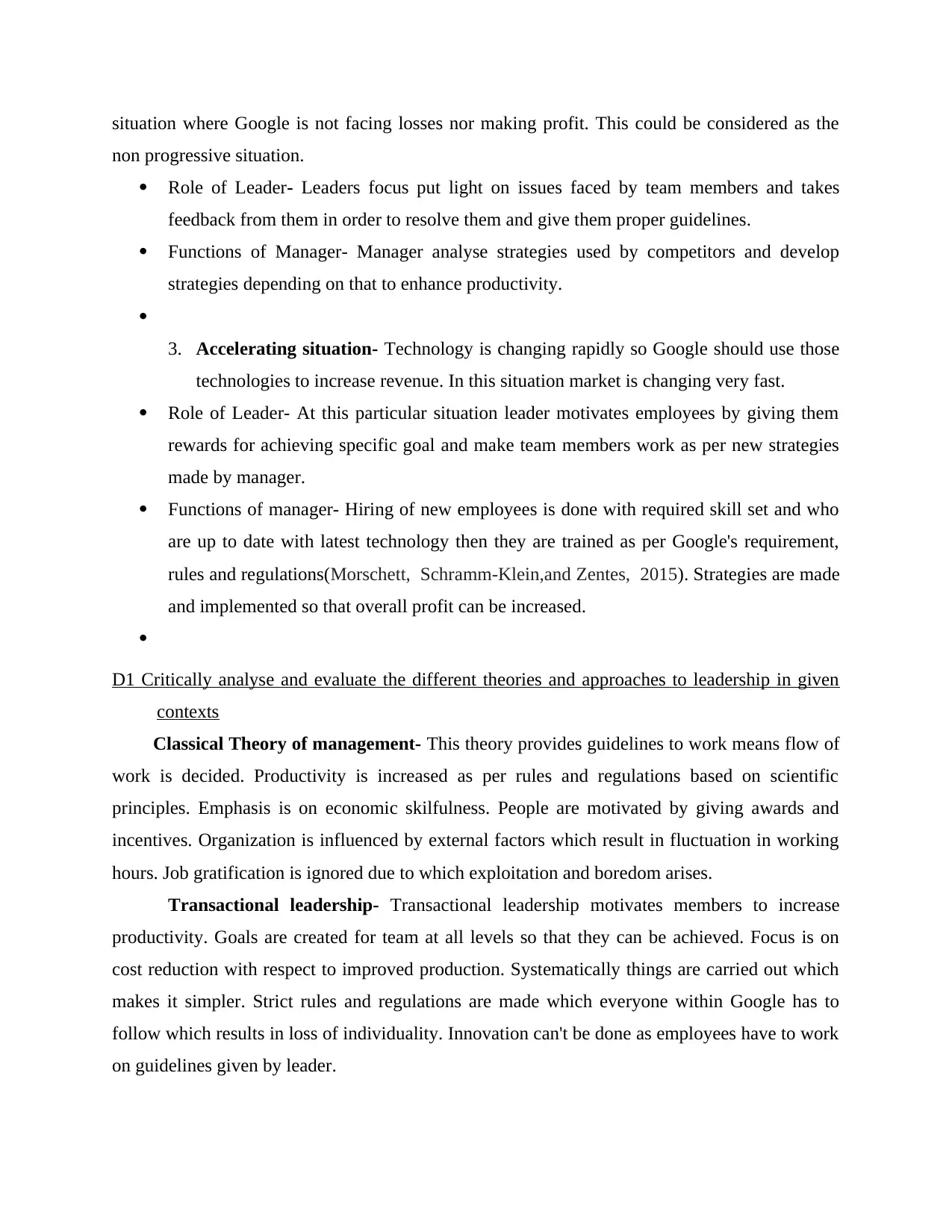
situation where Google is not facing losses nor making profit. This could be considered as the
non progressive situation.
Role of Leader- Leaders focus put light on issues faced by team members and takes
feedback from them in order to resolve them and give them proper guidelines.
Functions of Manager- Manager analyse strategies used by competitors and develop
strategies depending on that to enhance productivity.
3. Accelerating situation- Technology is changing rapidly so Google should use those
technologies to increase revenue. In this situation market is changing very fast.
Role of Leader- At this particular situation leader motivates employees by giving them
rewards for achieving specific goal and make team members work as per new strategies
made by manager.
Functions of manager- Hiring of new employees is done with required skill set and who
are up to date with latest technology then they are trained as per Google's requirement,
rules and regulations(Morschett, Schramm-Klein,and Zentes, 2015). Strategies are made
and implemented so that overall profit can be increased.
D1 Critically analyse and evaluate the different theories and approaches to leadership in given
contexts
Classical Theory of management- This theory provides guidelines to work means flow of
work is decided. Productivity is increased as per rules and regulations based on scientific
principles. Emphasis is on economic skilfulness. People are motivated by giving awards and
incentives. Organization is influenced by external factors which result in fluctuation in working
hours. Job gratification is ignored due to which exploitation and boredom arises.
Transactional leadership- Transactional leadership motivates members to increase
productivity. Goals are created for team at all levels so that they can be achieved. Focus is on
cost reduction with respect to improved production. Systematically things are carried out which
makes it simpler. Strict rules and regulations are made which everyone within Google has to
follow which results in loss of individuality. Innovation can't be done as employees have to work
on guidelines given by leader.
non progressive situation.
Role of Leader- Leaders focus put light on issues faced by team members and takes
feedback from them in order to resolve them and give them proper guidelines.
Functions of Manager- Manager analyse strategies used by competitors and develop
strategies depending on that to enhance productivity.
3. Accelerating situation- Technology is changing rapidly so Google should use those
technologies to increase revenue. In this situation market is changing very fast.
Role of Leader- At this particular situation leader motivates employees by giving them
rewards for achieving specific goal and make team members work as per new strategies
made by manager.
Functions of manager- Hiring of new employees is done with required skill set and who
are up to date with latest technology then they are trained as per Google's requirement,
rules and regulations(Morschett, Schramm-Klein,and Zentes, 2015). Strategies are made
and implemented so that overall profit can be increased.
D1 Critically analyse and evaluate the different theories and approaches to leadership in given
contexts
Classical Theory of management- This theory provides guidelines to work means flow of
work is decided. Productivity is increased as per rules and regulations based on scientific
principles. Emphasis is on economic skilfulness. People are motivated by giving awards and
incentives. Organization is influenced by external factors which result in fluctuation in working
hours. Job gratification is ignored due to which exploitation and boredom arises.
Transactional leadership- Transactional leadership motivates members to increase
productivity. Goals are created for team at all levels so that they can be achieved. Focus is on
cost reduction with respect to improved production. Systematically things are carried out which
makes it simpler. Strict rules and regulations are made which everyone within Google has to
follow which results in loss of individuality. Innovation can't be done as employees have to work
on guidelines given by leader.
Paraphrase This Document
Need a fresh take? Get an instant paraphrase of this document with our AI Paraphraser
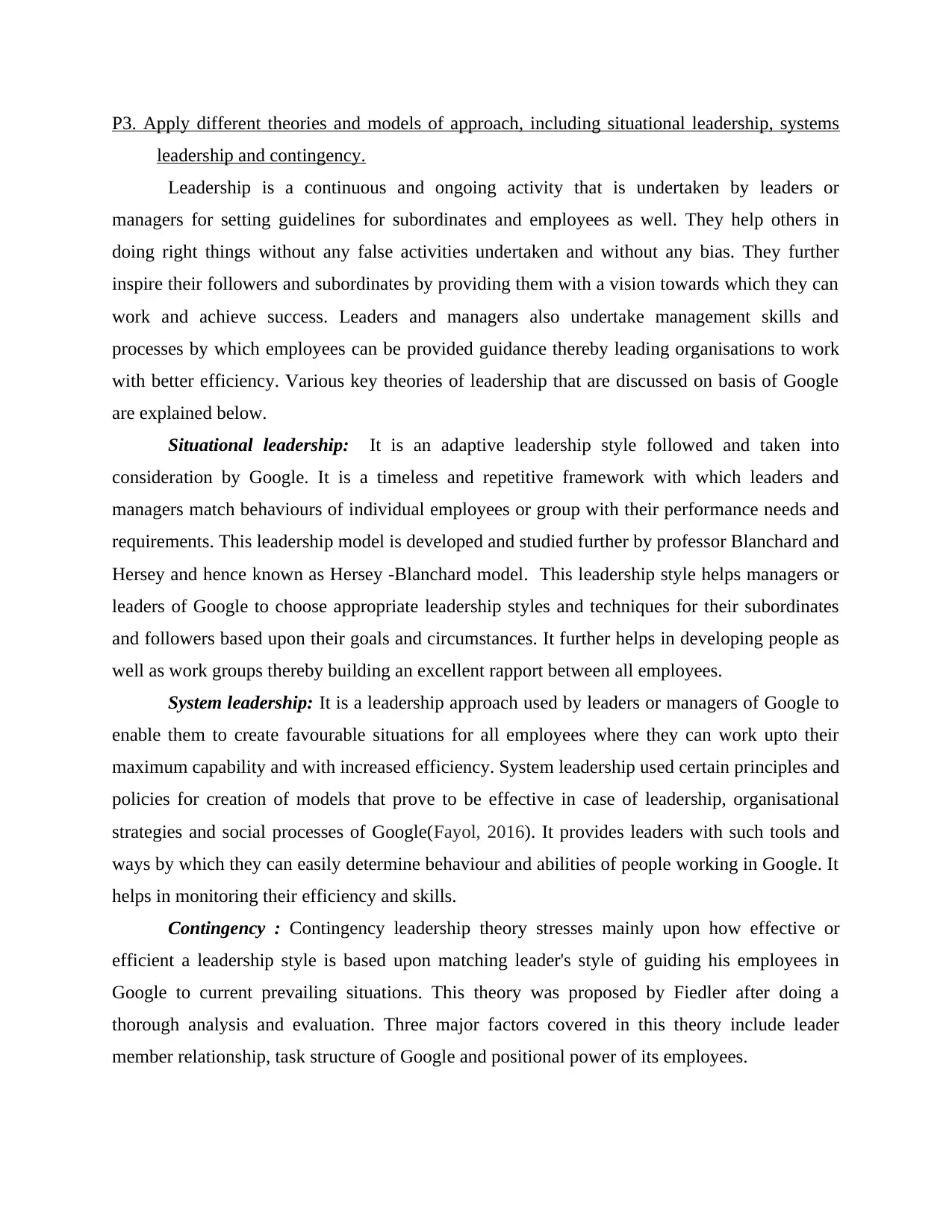
P3. Apply different theories and models of approach, including situational leadership, systems
leadership and contingency.
Leadership is a continuous and ongoing activity that is undertaken by leaders or
managers for setting guidelines for subordinates and employees as well. They help others in
doing right things without any false activities undertaken and without any bias. They further
inspire their followers and subordinates by providing them with a vision towards which they can
work and achieve success. Leaders and managers also undertake management skills and
processes by which employees can be provided guidance thereby leading organisations to work
with better efficiency. Various key theories of leadership that are discussed on basis of Google
are explained below.
Situational leadership: It is an adaptive leadership style followed and taken into
consideration by Google. It is a timeless and repetitive framework with which leaders and
managers match behaviours of individual employees or group with their performance needs and
requirements. This leadership model is developed and studied further by professor Blanchard and
Hersey and hence known as Hersey -Blanchard model. This leadership style helps managers or
leaders of Google to choose appropriate leadership styles and techniques for their subordinates
and followers based upon their goals and circumstances. It further helps in developing people as
well as work groups thereby building an excellent rapport between all employees.
System leadership: It is a leadership approach used by leaders or managers of Google to
enable them to create favourable situations for all employees where they can work upto their
maximum capability and with increased efficiency. System leadership used certain principles and
policies for creation of models that prove to be effective in case of leadership, organisational
strategies and social processes of Google(Fayol, 2016). It provides leaders with such tools and
ways by which they can easily determine behaviour and abilities of people working in Google. It
helps in monitoring their efficiency and skills.
Contingency : Contingency leadership theory stresses mainly upon how effective or
efficient a leadership style is based upon matching leader's style of guiding his employees in
Google to current prevailing situations. This theory was proposed by Fiedler after doing a
thorough analysis and evaluation. Three major factors covered in this theory include leader
member relationship, task structure of Google and positional power of its employees.
leadership and contingency.
Leadership is a continuous and ongoing activity that is undertaken by leaders or
managers for setting guidelines for subordinates and employees as well. They help others in
doing right things without any false activities undertaken and without any bias. They further
inspire their followers and subordinates by providing them with a vision towards which they can
work and achieve success. Leaders and managers also undertake management skills and
processes by which employees can be provided guidance thereby leading organisations to work
with better efficiency. Various key theories of leadership that are discussed on basis of Google
are explained below.
Situational leadership: It is an adaptive leadership style followed and taken into
consideration by Google. It is a timeless and repetitive framework with which leaders and
managers match behaviours of individual employees or group with their performance needs and
requirements. This leadership model is developed and studied further by professor Blanchard and
Hersey and hence known as Hersey -Blanchard model. This leadership style helps managers or
leaders of Google to choose appropriate leadership styles and techniques for their subordinates
and followers based upon their goals and circumstances. It further helps in developing people as
well as work groups thereby building an excellent rapport between all employees.
System leadership: It is a leadership approach used by leaders or managers of Google to
enable them to create favourable situations for all employees where they can work upto their
maximum capability and with increased efficiency. System leadership used certain principles and
policies for creation of models that prove to be effective in case of leadership, organisational
strategies and social processes of Google(Fayol, 2016). It provides leaders with such tools and
ways by which they can easily determine behaviour and abilities of people working in Google. It
helps in monitoring their efficiency and skills.
Contingency : Contingency leadership theory stresses mainly upon how effective or
efficient a leadership style is based upon matching leader's style of guiding his employees in
Google to current prevailing situations. This theory was proposed by Fiedler after doing a
thorough analysis and evaluation. Three major factors covered in this theory include leader
member relationship, task structure of Google and positional power of its employees.
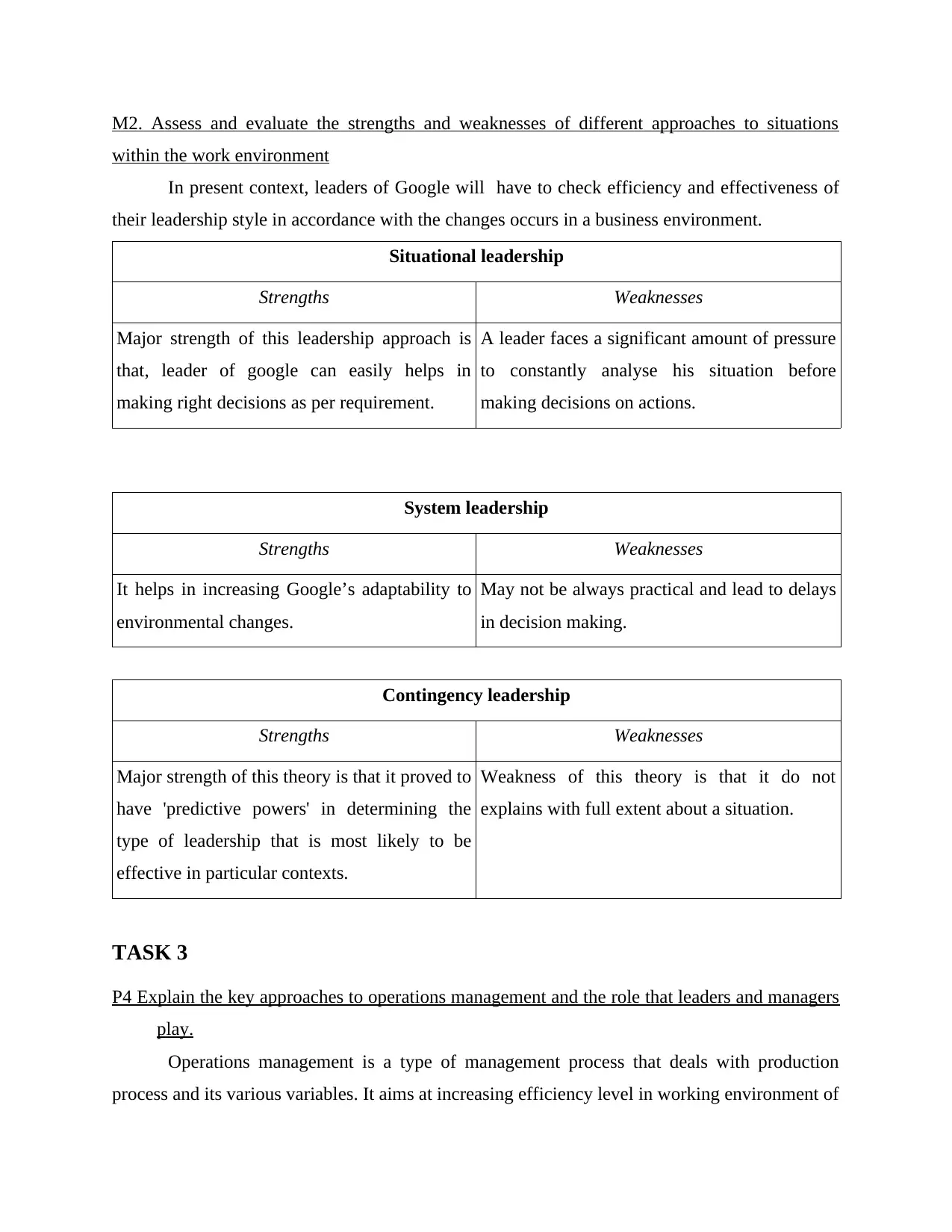
M2. Assess and evaluate the strengths and weaknesses of different approaches to situations
within the work environment
In present context, leaders of Google will have to check efficiency and effectiveness of
their leadership style in accordance with the changes occurs in a business environment.
Situational leadership
Strengths Weaknesses
Major strength of this leadership approach is
that, leader of google can easily helps in
making right decisions as per requirement.
A leader faces a significant amount of pressure
to constantly analyse his situation before
making decisions on actions.
System leadership
Strengths Weaknesses
It helps in increasing Google’s adaptability to
environmental changes.
May not be always practical and lead to delays
in decision making.
Contingency leadership
Strengths Weaknesses
Major strength of this theory is that it proved to
have 'predictive powers' in determining the
type of leadership that is most likely to be
effective in particular contexts.
Weakness of this theory is that it do not
explains with full extent about a situation.
TASK 3
P4 Explain the key approaches to operations management and the role that leaders and managers
play.
Operations management is a type of management process that deals with production
process and its various variables. It aims at increasing efficiency level in working environment of
within the work environment
In present context, leaders of Google will have to check efficiency and effectiveness of
their leadership style in accordance with the changes occurs in a business environment.
Situational leadership
Strengths Weaknesses
Major strength of this leadership approach is
that, leader of google can easily helps in
making right decisions as per requirement.
A leader faces a significant amount of pressure
to constantly analyse his situation before
making decisions on actions.
System leadership
Strengths Weaknesses
It helps in increasing Google’s adaptability to
environmental changes.
May not be always practical and lead to delays
in decision making.
Contingency leadership
Strengths Weaknesses
Major strength of this theory is that it proved to
have 'predictive powers' in determining the
type of leadership that is most likely to be
effective in particular contexts.
Weakness of this theory is that it do not
explains with full extent about a situation.
TASK 3
P4 Explain the key approaches to operations management and the role that leaders and managers
play.
Operations management is a type of management process that deals with production
process and its various variables. It aims at increasing efficiency level in working environment of
⊘ This is a preview!⊘
Do you want full access?
Subscribe today to unlock all pages.

Trusted by 1+ million students worldwide
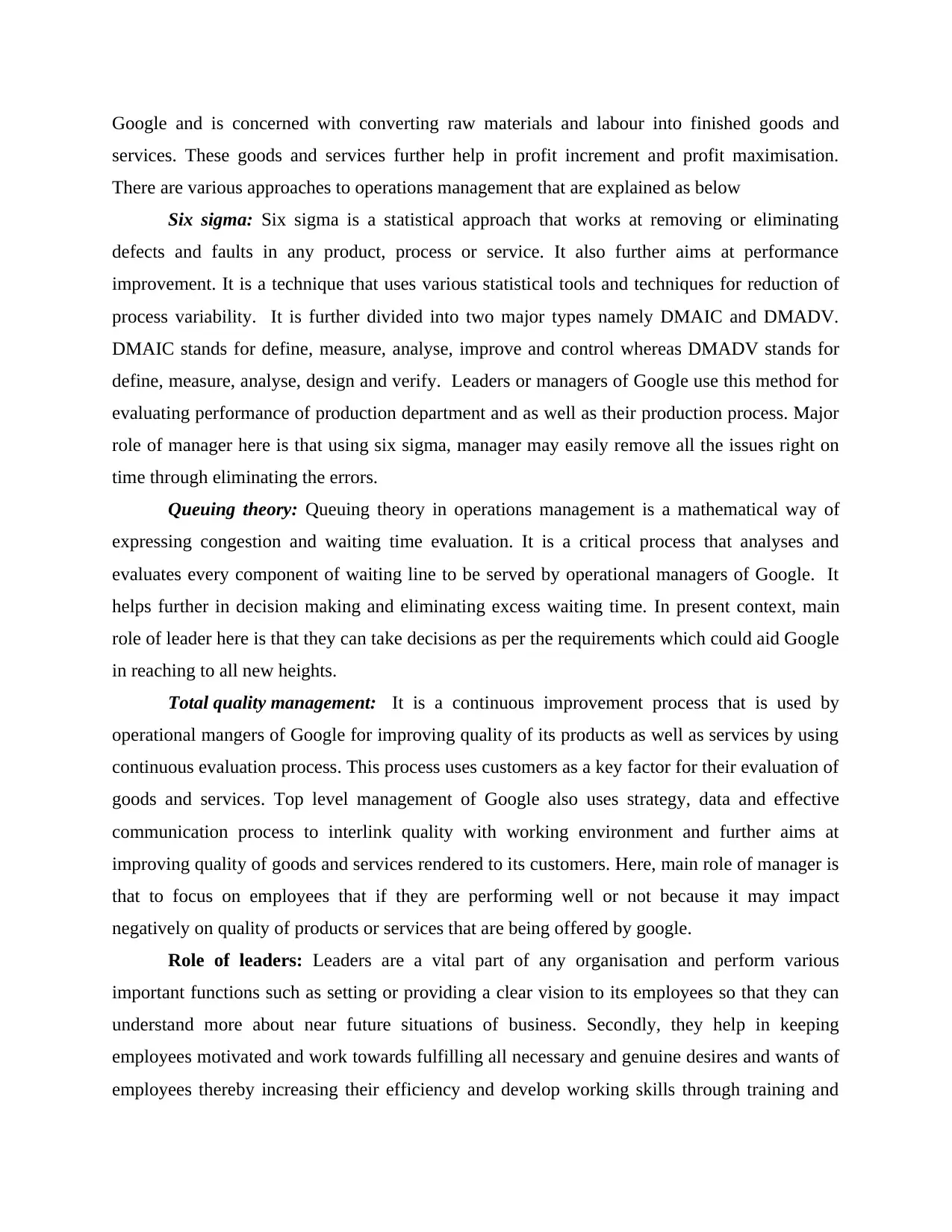
Google and is concerned with converting raw materials and labour into finished goods and
services. These goods and services further help in profit increment and profit maximisation.
There are various approaches to operations management that are explained as below
Six sigma: Six sigma is a statistical approach that works at removing or eliminating
defects and faults in any product, process or service. It also further aims at performance
improvement. It is a technique that uses various statistical tools and techniques for reduction of
process variability. It is further divided into two major types namely DMAIC and DMADV.
DMAIC stands for define, measure, analyse, improve and control whereas DMADV stands for
define, measure, analyse, design and verify. Leaders or managers of Google use this method for
evaluating performance of production department and as well as their production process. Major
role of manager here is that using six sigma, manager may easily remove all the issues right on
time through eliminating the errors.
Queuing theory: Queuing theory in operations management is a mathematical way of
expressing congestion and waiting time evaluation. It is a critical process that analyses and
evaluates every component of waiting line to be served by operational managers of Google. It
helps further in decision making and eliminating excess waiting time. In present context, main
role of leader here is that they can take decisions as per the requirements which could aid Google
in reaching to all new heights.
Total quality management: It is a continuous improvement process that is used by
operational mangers of Google for improving quality of its products as well as services by using
continuous evaluation process. This process uses customers as a key factor for their evaluation of
goods and services. Top level management of Google also uses strategy, data and effective
communication process to interlink quality with working environment and further aims at
improving quality of goods and services rendered to its customers. Here, main role of manager is
that to focus on employees that if they are performing well or not because it may impact
negatively on quality of products or services that are being offered by google.
Role of leaders: Leaders are a vital part of any organisation and perform various
important functions such as setting or providing a clear vision to its employees so that they can
understand more about near future situations of business. Secondly, they help in keeping
employees motivated and work towards fulfilling all necessary and genuine desires and wants of
employees thereby increasing their efficiency and develop working skills through training and
services. These goods and services further help in profit increment and profit maximisation.
There are various approaches to operations management that are explained as below
Six sigma: Six sigma is a statistical approach that works at removing or eliminating
defects and faults in any product, process or service. It also further aims at performance
improvement. It is a technique that uses various statistical tools and techniques for reduction of
process variability. It is further divided into two major types namely DMAIC and DMADV.
DMAIC stands for define, measure, analyse, improve and control whereas DMADV stands for
define, measure, analyse, design and verify. Leaders or managers of Google use this method for
evaluating performance of production department and as well as their production process. Major
role of manager here is that using six sigma, manager may easily remove all the issues right on
time through eliminating the errors.
Queuing theory: Queuing theory in operations management is a mathematical way of
expressing congestion and waiting time evaluation. It is a critical process that analyses and
evaluates every component of waiting line to be served by operational managers of Google. It
helps further in decision making and eliminating excess waiting time. In present context, main
role of leader here is that they can take decisions as per the requirements which could aid Google
in reaching to all new heights.
Total quality management: It is a continuous improvement process that is used by
operational mangers of Google for improving quality of its products as well as services by using
continuous evaluation process. This process uses customers as a key factor for their evaluation of
goods and services. Top level management of Google also uses strategy, data and effective
communication process to interlink quality with working environment and further aims at
improving quality of goods and services rendered to its customers. Here, main role of manager is
that to focus on employees that if they are performing well or not because it may impact
negatively on quality of products or services that are being offered by google.
Role of leaders: Leaders are a vital part of any organisation and perform various
important functions such as setting or providing a clear vision to its employees so that they can
understand more about near future situations of business. Secondly, they help in keeping
employees motivated and work towards fulfilling all necessary and genuine desires and wants of
employees thereby increasing their efficiency and develop working skills through training and
Paraphrase This Document
Need a fresh take? Get an instant paraphrase of this document with our AI Paraphraser
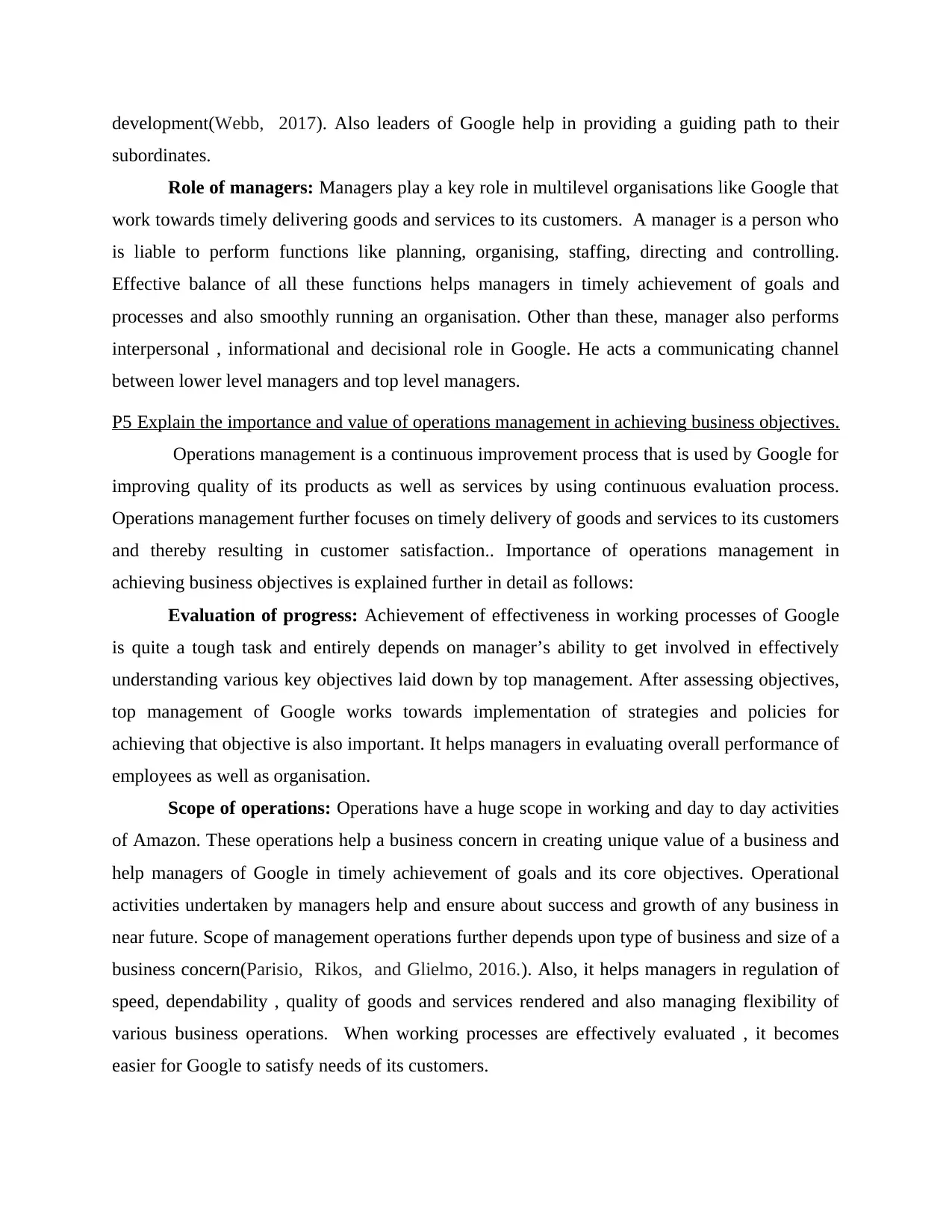
development(Webb, 2017). Also leaders of Google help in providing a guiding path to their
subordinates.
Role of managers: Managers play a key role in multilevel organisations like Google that
work towards timely delivering goods and services to its customers. A manager is a person who
is liable to perform functions like planning, organising, staffing, directing and controlling.
Effective balance of all these functions helps managers in timely achievement of goals and
processes and also smoothly running an organisation. Other than these, manager also performs
interpersonal , informational and decisional role in Google. He acts a communicating channel
between lower level managers and top level managers.
P5 Explain the importance and value of operations management in achieving business objectives.
Operations management is a continuous improvement process that is used by Google for
improving quality of its products as well as services by using continuous evaluation process.
Operations management further focuses on timely delivery of goods and services to its customers
and thereby resulting in customer satisfaction.. Importance of operations management in
achieving business objectives is explained further in detail as follows:
Evaluation of progress: Achievement of effectiveness in working processes of Google
is quite a tough task and entirely depends on manager’s ability to get involved in effectively
understanding various key objectives laid down by top management. After assessing objectives,
top management of Google works towards implementation of strategies and policies for
achieving that objective is also important. It helps managers in evaluating overall performance of
employees as well as organisation.
Scope of operations: Operations have a huge scope in working and day to day activities
of Amazon. These operations help a business concern in creating unique value of a business and
help managers of Google in timely achievement of goals and its core objectives. Operational
activities undertaken by managers help and ensure about success and growth of any business in
near future. Scope of management operations further depends upon type of business and size of a
business concern(Parisio, Rikos, and Glielmo, 2016.). Also, it helps managers in regulation of
speed, dependability , quality of goods and services rendered and also managing flexibility of
various business operations. When working processes are effectively evaluated , it becomes
easier for Google to satisfy needs of its customers.
subordinates.
Role of managers: Managers play a key role in multilevel organisations like Google that
work towards timely delivering goods and services to its customers. A manager is a person who
is liable to perform functions like planning, organising, staffing, directing and controlling.
Effective balance of all these functions helps managers in timely achievement of goals and
processes and also smoothly running an organisation. Other than these, manager also performs
interpersonal , informational and decisional role in Google. He acts a communicating channel
between lower level managers and top level managers.
P5 Explain the importance and value of operations management in achieving business objectives.
Operations management is a continuous improvement process that is used by Google for
improving quality of its products as well as services by using continuous evaluation process.
Operations management further focuses on timely delivery of goods and services to its customers
and thereby resulting in customer satisfaction.. Importance of operations management in
achieving business objectives is explained further in detail as follows:
Evaluation of progress: Achievement of effectiveness in working processes of Google
is quite a tough task and entirely depends on manager’s ability to get involved in effectively
understanding various key objectives laid down by top management. After assessing objectives,
top management of Google works towards implementation of strategies and policies for
achieving that objective is also important. It helps managers in evaluating overall performance of
employees as well as organisation.
Scope of operations: Operations have a huge scope in working and day to day activities
of Amazon. These operations help a business concern in creating unique value of a business and
help managers of Google in timely achievement of goals and its core objectives. Operational
activities undertaken by managers help and ensure about success and growth of any business in
near future. Scope of management operations further depends upon type of business and size of a
business concern(Parisio, Rikos, and Glielmo, 2016.). Also, it helps managers in regulation of
speed, dependability , quality of goods and services rendered and also managing flexibility of
various business operations. When working processes are effectively evaluated , it becomes
easier for Google to satisfy needs of its customers.
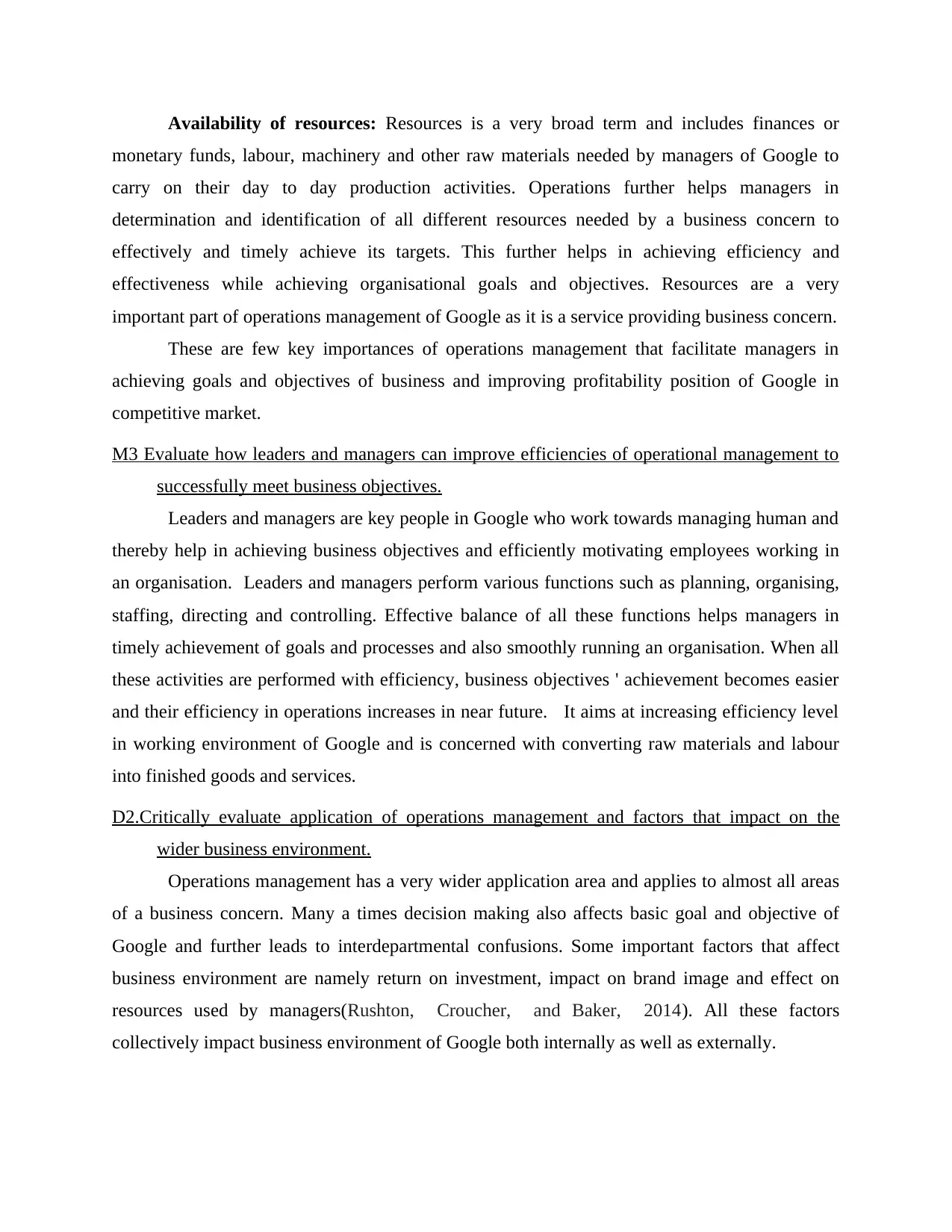
Availability of resources: Resources is a very broad term and includes finances or
monetary funds, labour, machinery and other raw materials needed by managers of Google to
carry on their day to day production activities. Operations further helps managers in
determination and identification of all different resources needed by a business concern to
effectively and timely achieve its targets. This further helps in achieving efficiency and
effectiveness while achieving organisational goals and objectives. Resources are a very
important part of operations management of Google as it is a service providing business concern.
These are few key importances of operations management that facilitate managers in
achieving goals and objectives of business and improving profitability position of Google in
competitive market.
M3 Evaluate how leaders and managers can improve efficiencies of operational management to
successfully meet business objectives.
Leaders and managers are key people in Google who work towards managing human and
thereby help in achieving business objectives and efficiently motivating employees working in
an organisation. Leaders and managers perform various functions such as planning, organising,
staffing, directing and controlling. Effective balance of all these functions helps managers in
timely achievement of goals and processes and also smoothly running an organisation. When all
these activities are performed with efficiency, business objectives ' achievement becomes easier
and their efficiency in operations increases in near future. It aims at increasing efficiency level
in working environment of Google and is concerned with converting raw materials and labour
into finished goods and services.
D2.Critically evaluate application of operations management and factors that impact on the
wider business environment.
Operations management has a very wider application area and applies to almost all areas
of a business concern. Many a times decision making also affects basic goal and objective of
Google and further leads to interdepartmental confusions. Some important factors that affect
business environment are namely return on investment, impact on brand image and effect on
resources used by managers(Rushton, Croucher, and Baker, 2014). All these factors
collectively impact business environment of Google both internally as well as externally.
monetary funds, labour, machinery and other raw materials needed by managers of Google to
carry on their day to day production activities. Operations further helps managers in
determination and identification of all different resources needed by a business concern to
effectively and timely achieve its targets. This further helps in achieving efficiency and
effectiveness while achieving organisational goals and objectives. Resources are a very
important part of operations management of Google as it is a service providing business concern.
These are few key importances of operations management that facilitate managers in
achieving goals and objectives of business and improving profitability position of Google in
competitive market.
M3 Evaluate how leaders and managers can improve efficiencies of operational management to
successfully meet business objectives.
Leaders and managers are key people in Google who work towards managing human and
thereby help in achieving business objectives and efficiently motivating employees working in
an organisation. Leaders and managers perform various functions such as planning, organising,
staffing, directing and controlling. Effective balance of all these functions helps managers in
timely achievement of goals and processes and also smoothly running an organisation. When all
these activities are performed with efficiency, business objectives ' achievement becomes easier
and their efficiency in operations increases in near future. It aims at increasing efficiency level
in working environment of Google and is concerned with converting raw materials and labour
into finished goods and services.
D2.Critically evaluate application of operations management and factors that impact on the
wider business environment.
Operations management has a very wider application area and applies to almost all areas
of a business concern. Many a times decision making also affects basic goal and objective of
Google and further leads to interdepartmental confusions. Some important factors that affect
business environment are namely return on investment, impact on brand image and effect on
resources used by managers(Rushton, Croucher, and Baker, 2014). All these factors
collectively impact business environment of Google both internally as well as externally.
⊘ This is a preview!⊘
Do you want full access?
Subscribe today to unlock all pages.

Trusted by 1+ million students worldwide
1 out of 16
Related Documents
Your All-in-One AI-Powered Toolkit for Academic Success.
+13062052269
info@desklib.com
Available 24*7 on WhatsApp / Email
![[object Object]](/_next/static/media/star-bottom.7253800d.svg)
Unlock your academic potential
Copyright © 2020–2025 A2Z Services. All Rights Reserved. Developed and managed by ZUCOL.





